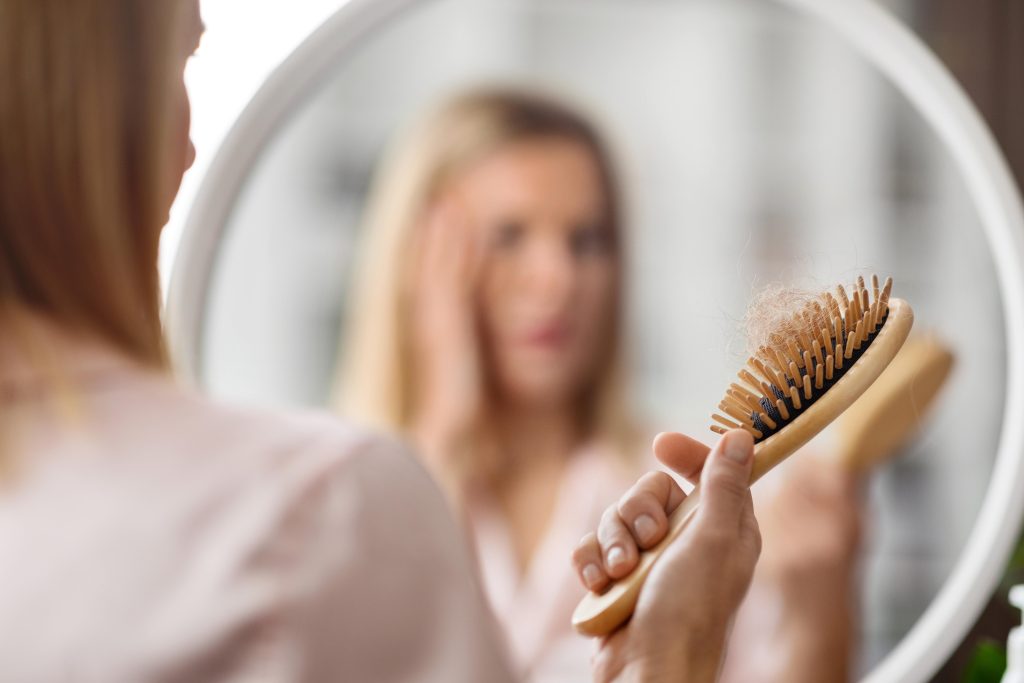
Hair loss is a common concern affecting millions of people worldwide. While it can be distressing, understanding the causes and available treatment options can empower individuals to manage their hair loss effectively. As dermatologists specializing in all types of hair and scalp conditions, the experts at Florida Dermatology and Skin Cancer Centers are here to shed light on this topic by offering guidance on how to address hair loss and how to move forward positively.
Reasons for Hair Loss
Hair loss can occur due to various reasons, including genetics, hormonal changes, medical conditions, medications, stress, nutritional deficiencies, and more. Understanding the underlying cause is crucial for determining the most appropriate treatment approach.
- Genetics: One of the most common causes of hair loss is genetic predisposition. Male and female pattern baldness, also known as androgenetic alopecia, is inherited and typically results in progressive hair thinning and eventual baldness.
- Hormonal Changes: Hormonal fluctuations can contribute to hair loss. Imbalances in hormones, such as those related to thyroid disorders, pregnancy, childbirth, menopause, or conditions like polycystic ovary syndrome, can disrupt the hair growth cycle and lead to hair loss.
- Scalp Conditions: Scalp conditions like fungal infections and psoriasis can lead to hair loss through inflammation and damage to hair follicles, obstruction of follicles due to scaling and crusting, and the autoimmune reaction characteristic of psoriasis. Persistent itching and scratching associated with these conditions can further exacerbate hair loss by traumatizing follicles and causing hair breakage.
- Medical Conditions: Certain medical conditions can cause hair loss as a symptom. These conditions include autoimmune diseases like alopecia areata, which causes patches of hair loss; scalp infections such as ringworm; skin disorders like lichen planus affecting the scalp; and underlying systemic illnesses like lupus.
- Medications: Some medications may have hair loss as a side effect. Chemotherapy drugs used in cancer treatment, anticoagulants, beta-blockers, retinoids, and certain antidepressants are examples of medications that can cause hair loss.
- Stress: Physical or emotional stress can trigger a type of hair loss called telogen effluvium. This condition causes a large number of hair follicles to enter the resting phase simultaneously, leading to excessive shedding and noticeable thinning of the hair.
- Nutritional Deficiencies: Inadequate intake of essential nutrients, particularly iron, protein, vitamins (such as biotin, vitamin D, and vitamin E), and minerals (such as zinc), can impact hair health and contribute to hair loss.
- Traction Alopecia: This type of hair loss occurs when hair is subjected to constant pulling or tension, often due to tight hairstyles like ponytails, braids, or hair extensions. Over time, this can damage the hair follicles and lead to hair loss.
- Age: As individuals age, the rate of hair growth tends to slow down, and hair follicles may become less active. This natural aging process can result in thinning hair and eventual hair loss, especially in men.
Signs of Hair Loss
Signs of hair loss can vary depending on the underlying cause and individual factors, but common signs include:
- Increased Shedding: Experiencing more hair shedding than usual, whether during washing, brushing, or throughout the day, can be a sign of hair loss.
- Thinning Hair: Noticeable thinning of the hair, particularly at the crown or along the part line, is a common sign of hair loss, especially in cases of androgenetic alopecia.
- Receding Hairline: A receding hairline, where the hairline gradually moves backward, exposing more of the forehead, is characteristic of male pattern baldness but can also occur in some cases of female pattern hair loss.
- Bald Patches: Developing bald patches or areas of hair loss on the scalp, which may vary in size and shape, is indicative of conditions like alopecia areata.
- Changes in Hair Texture: Changes in the texture or quality of the hair, such as increased brittleness, thinning, or lack of volume, can accompany hair loss.
- Visible Scalp: The scalp becoming more visible through the hair due to thinning or loss of hair density is a common sign of hair loss.
- Slower Hair Growth: Noticeably slower hair growth or a decrease in the rate of hair regrowth after shedding can indicate an underlying issue with the hair follicles.
- Changes in Hairstyle: Difficulty styling the hair as usual or needing to adjust hairstyles to conceal areas of thinning or baldness can be a sign of hair loss.
- Loss of Eyebrows or Eyelashes: Experiencing thinning or loss of eyebrows or eyelashes, particularly in patches, may be indicative of certain types of alopecia or underlying medical conditions.
- Scalp Irritation or Itching: Irritation, itching, or discomfort on the scalp, which may accompany hair loss conditions like alopecia areata or scalp infections, can also be signs to watch out for.
It’s important to note that experiencing one or more of these signs does not necessarily mean a person is experiencing significant hair loss, as some degree of shedding is normal. However, persistent, or worsening signs should prompt individuals to seek evaluation from a healthcare professional, such as a dermatologist, to determine the underlying cause and appropriate management.
Where Hair Loss Can Occur on the Body:
Hair loss can affect not only the scalp but also other areas of the body, including eyebrows, eyelashes, beard, and body hair. The pattern and extent of hair loss may vary depending on the underlying cause.
Who Can Experience Hair Loss:
Hair loss can affect individuals of all ages, genders, and ethnicities. While some types of hair loss are more common in specific demographics (such as male pattern baldness in men), others, like alopecia areata, can occur in anyone regardless of age or gender.
Treatment Options for Hair Loss:
Treatment options for hair loss vary depending on the underlying cause and the individual’s specific needs. They may include topical treatments, oral medications or supplements, injections (such as corticosteroids for alopecia areata), platelet-rich plasma (PRP) therapy, low-level laser therapy to stimulate cellular activity and promote hair growth, and surgical interventions (such as hair transplantation).
Certain prescription shampoos or treatments containing ingredients like ketoconazole, salicylic acid, or corticosteroids may also be recommended to manage scalp conditions contributing to hair loss, such as dandruff or seborrheic dermatitis.
Adopting a healthy lifestyle, including a balanced diet rich in essential nutrients, managing stress levels, avoiding tight hairstyles that cause traction alopecia, and practicing good hair care habits, can also help support overall hair health and minimize further hair loss.
When to See a Dermatologist for Hair Loss:
It’s essential to consult a dermatologist if you experience significant or persistent hair loss, notice changes in your hair growth pattern, or have concerns about your hair and scalp health. Early intervention can improve treatment outcomes and prevent further hair loss. It’s also important to consult with a dermatologist specializing in hair disorders to determine the most suitable treatment plan based on individual needs and circumstances. Combination therapies or a tailored approach may be necessary for optimal results in managing hair loss.
How Treating Hair Loss Can Positively Affect an Individual’s Quality of Life:
Managing hair loss can have a significant impact on an individual’s quality of life. It can help boost confidence, self-esteem, and overall well-being. By addressing the underlying cause and implementing appropriate treatment strategies, individuals can restore their hair health and feel more comfortable and confident in their appearance and bring them back to a sense of normalcy.
We understand the challenges that come with experiencing hair loss, but we hope to also bring encouragement. If you are facing hair loss of any kind, know that you are not alone and there is hope for treatment. The expert team at Florida Dermatology and Skin Cancer Centers is here to support you. With specialization in all skin and hair conditions, our expert dermatologists are well-equipped to offer optimal treatment solutions.
Contact us today to prioritize your hair and scalp care.
Contact FLDSCC for All Your Skin Care Needs
Florida Dermatology and Skin Cancer Centers provides a full spectrum of dermatology and skin care services, and its team of physicians, APRNs, and PAs are experts in diagnosing and treating skin cancers with the latest technological options. Medical Director, Dr. K. Wade Foster, is fellowship-trained in Mohs surgery, the most effective technique for most types of skin cancers, with minimal scarring or risk.
For more information about the services that Florida Dermatology and Skin Cancer Centers provides, or to make an appointment for a skin exam, visit https://fldscc.com/ or contact us at (855) FLD-SKIN.


